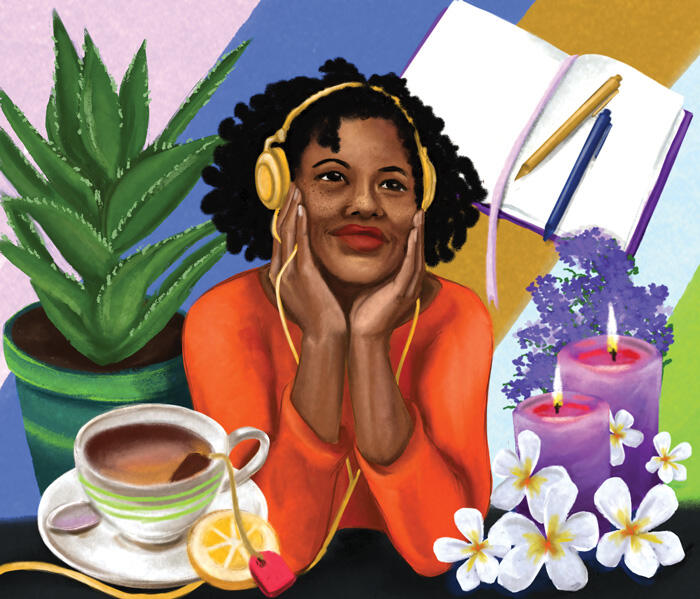Our collective movement to build an equitable society is unsustainable unless we adopt practices rooted in honoring our humanity and well-being. If we are not well, then our work is undermined and so is our support for the young people we serve. As we seek to dismantle systems of oppression that threaten democracy, we must also disrupt ideas and practices that endanger our ability to be.
Rhetoric in education and activist spaces too often suggests—or even insists—that healthy lifestyles and boundaries have no place, praising those who elevate work above well-being. This mindset is harmful to us and the young people in our care. And the prioritizing of work over wellness is especially damaging to communities of the global majority and those who have been historically relegated to societal margins—such as women, LGBTQ+ people, immigrant groups, individuals with disabilities, those experiencing poverty and others. The demand to give so much of ourselves, to labor under destructive conditions, compounds existing injustices in health care, public safety, economic security and environmental sustainability in our communities, thus increasing health risks.
Racist and biased legislation and policies imperil our rights and well-being. In our work to confront and change these systemic injustices, we must keep our health at the forefront so we can continue in this movement for justice and support the young people in our lives.
How Can We Honor Self-Care at the Intersections of Race, Gender and Poverty?
- Acknowledge self-care and wellness as forms of resistance necessary for survival.
Practices that honor our well-being are not merely “nice-to-haves.” We must embrace actions rooted in our right to be and to thrive. We must acknowledge how activist and social justice work impacts the mental health of those being harmed and those working to eradicate harm. We must also pay attention to activists who die by suicide and those who are burdened deeply by the work. We must prioritize our mental health and implement practices to ensure that we are well. - Recognize how all forms of bias and oppression are fueled by and work in tandem with our lack of self-care.
Forms of oppression and patterns of domination are perpetuated when people are overburdened and less likely to engage in practices of resistance and liberation—such as thinking creatively, utilizing art to resist, creating new ways of being, and working and coming together in community to process, breathe and plan strategies. Educators in particular are often so inundated with work they have little time to adopt liberatory practices, prioritize well-being, or utilize their intelligence to, as Bettina Love, Ph.D., describes it, “freedom dream.” - Create cultures of wellness and model self-care practices for young people.
We must vigilantly work against “grind culture” and spaces rooted deeply in capitalism. Being conscious of the impact our wellness—and lack thereof—has on the young people in our lives can help better equip us to show up for children in loving, beneficial ways. When we model self-care and healthy practices, we help young people prioritize wellness, which positively affects their learning and engagement in the world. In education and activist spaces, we must build practices of care in our work to promote the rights and well-being of the young people and communities we endeavor to serve.
Practices for Health and Wellness
- Adopt holistic wellness practices that honor your individuality.
Creating care around all parts of our lives is essential to living and working in ways that honor our entire being. For practices to be meaningful, consider brainstorming individual wellness needs in all areas of life. What do we need to be physically, emotionally and mentally well? What financial resources are necessary for our well-being? What do we need to be well in the spaces where we do this work? And what do we need in our personal lives for spiritual and social well-being? Exploring our individual needs in all spheres of our lives encourages us to implement holistic practices. - Reach out for therapy and mental health support.
Therapy and other forms of mental health support have been stigmatized historically, which can make seeking this form of support difficult. Yet we can practice active care and model wellness for others by seeking support for our own mental well-being. We should pursue therapy to deal with trauma and for mental health checkups. Working with a professional in a safe environment regarding how to navigate heavy workloads and set goals can help to ensure we live our best possible lives.
At times, medication can enhance our mental wellness. I unapologetically share that I began taking medication when I worked in schools, and particularly as a school leader, because of the workload and a lack of support—often fueled by dangerous beliefs around wellness and self-care. I suffered panic attacks, serious sleeping problems, anxiety, depression and other bodily issues that necessitated my use of medication. While I was initially ashamed and nervous, combining therapy and medication offered me the stability to continue until I found other ways to support my overall being. - Honor Indigenous and other forms of cultural care and healing.
Wellness, especially for people of the global majority, should also include reclaiming, accessing and practicing Indigenous and other forms of cultural care and healing. Often, healing and wellness spaces center what white people consider wellness and negate what Black and Brown people need for healing and wellness.
As a Black woman, I am learning to lean heavily into cultural forms of care such as laughter, exploring nature and grounding practices like placing my feet into the earth. I have also learned, studied and now teach Eastern practices such as yoga, meditation and Reiki. Wellness does not have to look a particular way. The best forms of wellness are those practices that honor who you are and what you need.
Healing in the Black community includes laughter, healthy gatherings with family and friends, somatic practices, and getting into the body. Letting go of intergenerational trauma happens by learning about it and releasing that pain through movement or sound and engaging with the ocean, for example, or nature in general.
Wellness and healing practices might also include:- Working with energy healers or medicine people who promote and apply practices outside of Western and European approaches.
- Journaling and creating art.
- Reading and listening to music.
- Camping, hiking, swimming and other outdoor activities.
- Healing in women’s circles.
- Participating in ceremonies where negative thoughts, ideas and practices are written on paper and burned—for people of the global majority this is especially healing and serves as a form of reclamation.
- Create daily practices rooted in wellness and care.
Daily and weekly routines around self-care and mental health might include:- Waking up early enough to engage in spiritual, gratitude or mental practices—such as affirmation writing or journaling—that help manage the mind for the day.
- Taking time to engage in practices that care for your body and physical health.
- Drinking water—or warm water with lemon or lime—to flush the body.
- Eating nourishing meals to begin the day.
- Preparing healthy meals for the day or week.
- Setting goals for the day.
- Tending to your emotional needs before you attend to everyone else.
- Establishing a practice or routine for winding down at the end of the day.
- Creating a sanctuary in your home in ways that resonate for your needs.
- Set boundaries and leave when you need to.
Set boundaries. Say no. Believe, trust and know that “no” is a complete sentence. Honor yourself by setting boundaries, even if others villainize you for it. We must advocate for ourselves and know we are more powerful and productive when we have firm boundaries in place. - Ask for help and lean into community.
A tool of oppression is praise for individualistic practices. In contrast, many African and Indigenous cultures honor and recognize the importance of community. Return to this; ask for help when you need it. Find your community in the people who accept you and where you feel visible. Find people who recognize the importance of self-care, wellness and healthy boundaries.
Whatever our role in this movement—educator, activist, parent, caregiver or concerned community member—we are needed. The work for justice is crucial, but we are unable to offer support and to give freely unless we are well. When we are healthy and cared for, when we have what we need, we are then able to truly hold space for others because, rather than give from lack, we can give from a place of overflow.
Resources
Webinar: The Value of Educator Self-Care
Article: Self-Care Can Be Social Justice by Jamilah Pitts



0 COMMENTS